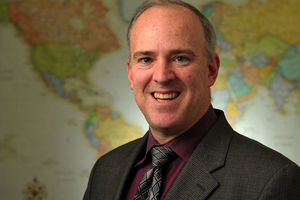
A surprising number of high-profile peacebuilders in the last generation have been religious figures, says Daniel Philpott of Notre Dame’s Kroc Institute for International Peace Studies. Faith-motivated people — from Archbishop Desmond Tutu and Pope John Paul II to theologians and activists working in every major religion worldwide — have promoted the concept of reconciliation, which has shaped the politics of countries from South Africa and Guatemala to Timor-Leste and Iraq.
“The idea of reconciliation has deep roots in Judaism, Christianity, Islam, and other faiths,” says Philpott, associate professor of political science and peace studies, who is directing a new research program on religion and reconciliation at the Kroc Institute. “To be sure, religious people are not always reconcilers; in some settings they are supporters of violent division. Nor is reconciliation an exclusively religious concept. But reconciliation does have a strong affinity to religion, and many religious people are highly motivated to be peacebuilders.”
The concept of reconciliation offers fertile ground for scholarly research and rich resources for peacebuilding, Philpott says. “A few scholars have done high-quality work on these topics, but many unanswered questions and controversies remain. For example, how does reconciliation differ from the ‘liberal peace,’ the prevailing concept at the United Nations and most western governments? Can religiously based reconciliation be effectively practiced in pluralistic societies? Does forgiveness disempower and disrespect victims, or does it empower victims to heal societies? What empirical evidence exists that religious peacebuilders have made a difference?”
Philpott is currently working with Jennifer Llewellyn of Dalhousie University Law School in Nova Scotia, Canada, to develop the concepts of restorative justice and reconciliation as peacebuilding and to explore their meaning for forgiveness, amnesty, truth telling, and reparations. A team of scholars also has been commissioned to write papers on these concepts, and they will present them at a Kroc Institute workshop in fall 2010.
Philpott is a scholar of religion and global politics. He is the author or editor of Revolutions in Sovereignty: How Ideas Shaped Modern International Relations (Princeton University Press); The Politics of Past Evil: Religion, Reconciliation, and Transitional Justice (Notre Dame Press); and Strategies of Peace (Oxford University Press), a collection of essays on strategic peacebuilding. He is working on a book titled Just and Unjust Peace: An Ethic of Political Reconciliation, which offers guidelines to political orders facing pasts of civil war, genocide, and dictatorship.
Contact: Daniel Philpott, (574) 631-7667, jphilpot@nd.edu